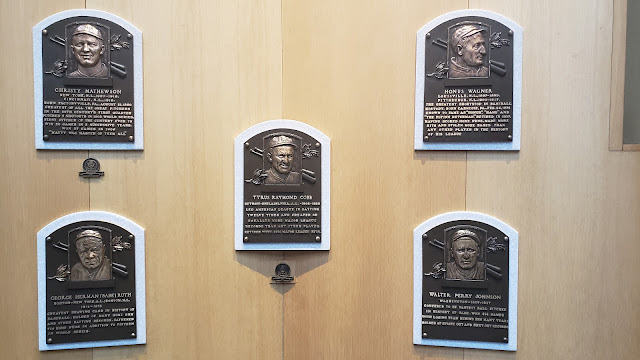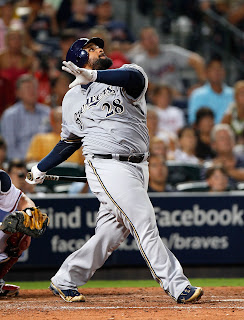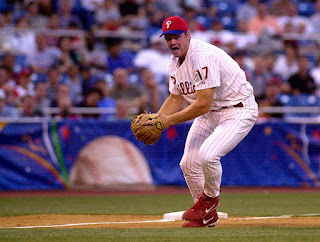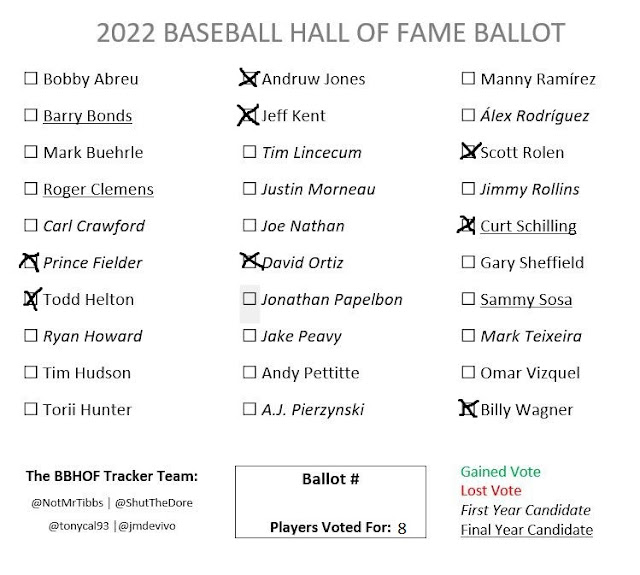In a blog tradition, I am once again conveying my thoughts on who I would vote for if I had a BBWAA ballot for the 2022 National Baseball Hall of Fame.
 |
| The Hallowed Halls of Cooperstown Await greats to join them |
The BBWAA vote will be revealed on Major League Baseball (MLB) Network on Tuesday, January 25, 2025. The Hall of Fame vote reveal remains one of the most anticipated moments on the baseball calendar and certainly of the offseason. Here is the 2022 National Baseball Hall of Fame Candidates Eligible for vote (via Baseball Reference with prior year percentage total for returning candidates). 75% of all ballots cast must include the players name for induction.
As most readers probably know, the actual voting committee is the Baseball Writers' Association of America (BBWAA). Prior to 2016, once a member, always a vote. In 2016, several changes to the voting process were made (see my related Blog here) culling the list of voters to those who had covered the game in the prior 10 years. This played out to remove a number of small vote ballots and increase percentages for those on the bubble.
 |
| Inductees join the "Original 5" Class of 1939 |
There are a few overarching factors that cannot be ignored when it comes to voting to cover before we get to the specifics.
1) A major, controversial specter over the Hall will continue to be how to handle candidates associated with Performance Enhancing Drug (PED) use in baseball primarily in the 1990s and early 2000s, an era for which many players accused are now appearing on the Hall of Fame ballot. There are players whose on-field performance clearly merits first ballot election, however because of their associated with substances that enhanced their performance, some members of the BBWAA have been hesitant to cast votes their way at least in the 75% needed for induction. Because the official voting rules include the words "integrity, sportsmanship, and character," their reluctance is justified in my mind. For my selection, I will not presume guilt, but if there is legal, eyewitness (including Mitchell Report) or strong anecdotal evidence of PED use, I will strongly weigh against voting for the candidate. You can count me in the "The PED STJ" type here in a blog a few weeks ago. That means, I absolutely think Barry Bonds, Alex Rodriguez, and Roger Clemens (and Manny Ramirez) are Hall of Famers without PEDs but I hold them accountable (just like the person who did lots of good things but committed a crime...he still committed a crime)
2) A change in consideration for me is how to assess pitchers. Whereas the 300-win plateau with a low ERA reflective of the dead ball, or pitcher dominated, eras prior to 1970 used to be a norm, it's become increasingly more difficult to get wins in the era of specialty relievers with starters leaving the game before the end of the sixth inning many times in close games. Conversely, however, one would think this would benefit starting pitchers ERA by seldom going through a lineup more than twice in some cases, rarely more than three times. Also, after many years of closers not being strongly considered, Mariano Rivera became the first and only to date unanimous inductee to the Hall, along with Trevor Hoffman and Lee Smith in recent years. The doors have opened a bit in that regard. In the end, I strongly weigh dominance over a reasonable period of time, along with Cy Young Awards, All-Star games, win titles, career saves, and ERA.
3) There is also first and last ballot bias. First ballot candidates some BBWAA voters seem reticent to vote in to protect some sort of integrity of being a "first ballot hall of famer". Evidence, three voters who did not include Ken Griffey Jr. in 2016. Likewise, when a player is on his last ballot (as Tim Raines was in 2017, Edgar Martinez in 2019, and Larry Walker in 2020) voters who previously withheld a vote tend to pay a bit more attention to their candidacy considering it's a final shot and vote favorably. This year the normal last ballot bump bias is overcome by number 1 (Clemens and Bonds) or other factors (Schilling asking not to be on the ballot). Unlike prior candidates listed above who were very likeable players, these three created more chasms than fans. They won't see a big bump. Everyone is set in their ways and in the case of Schilling, are more apt to go the other way.
So how do I sort through very worthy candidates that each has at least some argument for a vote for induction. Here's some parameters I use
1) I don't deal with first ballot / last ballot. I may sway in between as I hear arguments, but I'm not going to withhold someone I know I think should get in, nor be swayed in the last year. Example, Schilling, was not a proponent earlier but more I heard arguments I came around and began to vote for him.
2) I don't hold OFF THE FIELD issues (to an extent) against the player. Don't care that Schilling is unlikable or has some political view that is disagreeable. I do need to consider Domestic Violence as that becomes an integrity issue. I do not vote for Vizquel anyway, so move on.
3) Per the above, not me for PED guys. You're welcome to vote for them I'm not. Even if Selig, who shouldn't be in, is in (see number 6 below)
4) I don't handicap candidates if they played in Coors Field (Colorado) or DH's or were on good teams for win. Stats are stats, it is what it is, games are played there, value exists wherever.
5) I struggle voting for candidates with good cumulative stats but never great. This makes me look for high finishes in MVP and All-Star appearances. Silver Sluggers and Gold Gloves help. If you hit 30 HR for 15 years but everyone else hitting 45+ it's a sign of the times. Also, bold stats, leading the league in meaningful things, matters.
6) Comparisons to "this guy is in, so should this guy" or "if he isn't in, this guy can't be". It's candidate against criteria. I actually looked at Lance Berkman as a guy not in as someone who should be exceeded and quickly realized stat comparisons to him for a below 5 percent first ballot guy is tough because his numbers hold against guys already in, yet he isn't even close.
7) I lean toward classic stats (Average, HR, Runs, RBI, Steals, okay to combing OBP/SLG for OPS). WAR I don't get, rewards longer play, I don't know who the replacement is and while I agree it can be an assessor, it's not for me. So don't say "if this player has X WAR, and this player has X+10 WAR, I must change my mind". Eye test trumps all that.
8) As stated above, pitching is tough. Starters need to find themselves in Cy Young Top 10s. Relievers must meet the Lee Smith or Bruce Sutter entry bar. Few do.
With a limit of ten players on a ballot, here are the players I would put on my ballot (in order of my credibility).
 |
| David Ortiz swing terrorized opponents |
1) David Ortiz - Elite power hitter for a number of years on winning teams. Leader of those teams. 541 career home runs. Five straight years of MVP Top 5 finishes (2003-2007, 2 World Series titles in that span). Twice led the league in RBIs. 10 All Star Appearances. Three World Series titles. A World Series MVP. An ALCS MVP. One of the great hitters of his era. Okay, he was a DH. Hitting is hitting and he did it. So, what about the elephant in the room? He's right there for me on whether or not he was bolstered by PEDs, however most of his numbers came well after testing and there didn't seem to be a pattern of issues. It's subjective. But I'm giving the benefit of the doubt here.
 |
| Billy the Kid |
Factors against him: Only 900 career IP, lack of postseason success
Wagner has increased about 15% each of the last two rounds which bodes well. As several high-profile inductees cleared the list to make room on ballots and he seems to be getting more positive attention and buzz, which is good. In the past I felt like he wouldn't get in on the BBWAA ballot. I now think he will in Year 9 or 10.
 |
| Helton Belts one |
Factors against him: Playing in Denver, huge home/road split differences, limited post-season action.
Helton jumped from 16.5% to 29.2% in his first to second year (then up to 44.9% in his third). This is encouraging. He'll likely get in by year 7 or 8.
 |
| Kent joins Clemens, Bonds, Sosa, Rollins, Morneau as former MVPs on the ballot |
4) Jeff Kent - One of the top offensive second basemen of all time. His line across the major stats is .290, 377, and 1518. He has an MVP in his closet, and three other Top 10 finishes. Add to those six All-Star appearances and four silver sluggers. He's 54th all time in RBI (more than Mantle, Vlad, Rice) with most of those eligible ahead of him already inducted. His power numbers dwarf fellow HOF 2B Ryne Sandberg and Roberto Alomar but is getting very little buzz or momentum.
Factors against him: Below average on defense, late bloomer, played in a power era in which his home run numbers aren't considered extraordinary, cold to media.
Kent started around 15% and only last year got more than 20% with 27.5% of the votes. Now in his eighth year it seems like he won't get close. Not a popular guy around the league from my memory he may not get much love on Era Committee ballots either.
 |
| Shilling was a dominant force |
Factors against him: The aforementioned lackluster wins/ERA take him from can't ignore to can ignore but mostly his interaction with the media and political opinions.
Schilling went from 61% to 70% from year 7 to year 8 but not much last year. Normally this momentum would be certain to get in, however that 30% against him may be inconvincible. Like Kent, if he doesn't get in by 2022, he may not get Era Committee support due to his lack of likeability within the game.
 |
| Fielder had a sweet swing |
6) Prince Fielder - This is a contrarian pick, but I stand by Fielder even ahead of the next two votes. It's getting razor thin as to which side he several others fall when it comes to in or out. Here's where a dominance over a shorter era for me trumps longer term numbers (like a Bobby Abreu). Fielder was one of the premier hitters in the league for his 12-year career. Six All-Star games. Four Top 9 MVP finishes, another two in the Top 20 (that's half his career). Led the league once each in HR, RBI, and BB. Oh, and played 162 games 4 times, over 157 games 9 times (out of 12 years, the only he didn't was rookie year, and two of his last three injury plagues years). He was too good of a hitter over very many good years to ignore.
Factors against him: Short career. Voters like cumulative stats he doesn't have those. But 306 HR over 9 healthy, non-rookie years is something. And those years were bangers.
A first ballot guy, I don't think he'll get much momentum early. BBWAA voters tend to career guys early in their voting cycle. I just hope he gets 5%
 |
| Rolen had 5 tools |
7) Scott Rolen - We're now entering an extremely fine line for my vote. I'm really on the fence on Rolen, previously did not vote but now am. He absolutely never led the league in anything. Seven All-Star appearances (in 17 years) is decent but not overwhelming. I'm putting all my chips in defense and third base being a position that is overlooked for Hall of Famers. Third base is one where it's as demanding defensively as SS at times, yet offense for a corner OF or 1B is expected. It's a physically demanding position. He was part of a number of postseason runs.
Factors against him: Only one Top 10 MVP finish. Never led the league in any major stat. Wasn't that guy in the lineup you worried about beating you that day.
Jumped to over 50% in 2021 is likely on the long-term track now in his 5th year. Won't get in this year, 2023 or 2024 is likely. He'll be worthy.
 |
| Andruw Jones was unmatched with the glove |
8) Andruw Jones - Power, speed, and defense, he was a 5-tool player. Started his career at 19, but wore out at Age 35, he still hit well over 400 HR. His .254 batting average really drags him down, with a lack of huge walk numbers it leaves him only .337 OBP. His defense was his calling card, but also won a Silver Slugger and narrowly missed the MVP in 2005 to Albert Pujols. I'm now for him for the leading the league stats and MVP finishes. Five great years in a 7 year span and 153 games or more 11 straight years. Just on the border due to longevity, but I've flipped my vote to a yes, he meets the criteria
Factors against him: Low batting average, barely was a factor after age 30.
After two years of barely staying on the ballot, is starting to at least get discussion. Year 3 was 19.4% then 33.9% last year. Seems to have more buzz even than a Helton who is a better candidate. I've seen more social media campaigning on him than anyone. I think he'll get in year 9 or 10. And deserved.
First three out
9) Jimmy Rollins - Rolen and Rollins are so close. Rollins at least has an MVP (but not that many other sniffs of MVP Top 10s.). Rollins's league leading stats focus on AB, runs, triples, and SB. On base percentage of .324 is not so good for a leadoff guy. A few Gold Gloves but seemed more lifetime achievement than highlight reel stuff. I don't like to compare one to one with Hall of Famers, but I look to Barry Larkin as an entry level offensive minded, modern era SS and Rollins isn't that close to him. So I'm passing now.
Factors against him: Lack of several outstanding seasons, just 3 All-Star appearances, doesn't seem to excel over his peers in his era.
Wait and see, I hope he gets momentum and consideration in the second half of his candidacy.
10) Tim Hudson - His 222 wins get my attention (where 200 is the new 300 probably). 3.49 ERA is pretty good for his era. Seven years of 16 wins or more shows some consistent keeping his team in games. As does 9 seasons of 31 or more starts. Also, four Top 4 Cy Young finishes. Starting to look like he matches up well for HOF contenders, more wins and comparable ERA to Schilling, much better than Morris or Mussina. There are just numbers here we need to think about, and I plan to for a few more years. He wasn't on my watch list last time, he is now.
Factors against him: Only 4 All-Star appearances. Just one post-season wins in 14 starts (numbers are good, just didn't bring home the wins).
He skated in with just over 5% of the vote initially, behind others that I'm not listing here
11) Bobby Abreu - I will at least say he needs more discussion. If you look at all the 2022 NBHOF candidates OPS, the only two ahead of him not associated with PEDs is the aforementioned Todd Helton and Prince Fielder. Switch hitter with eight years in a row of over 100 walks, was durable playing 162 twice during his career. Modest power but produced 100 RBI in eight seasons. Good speed as well with 400 career SBs. But no Top 10 MVP finishes, one Silver Slugger and one Gold Glove and only two All Star games. I think overlooked but not worthy in the end.
Factors against him: Never seemed elite related to peers (see AS Games, SS, GG), not a lot of home run power
Barely eeked out 5.5% of the vote in his first ballot certainly is better than that. In a low year of top candidates (Jeter, Walker cleared, no major first timers) he has a few hearty followers likely to keep him on the ballot but little chance of ever being inducted.
Most of the remaining repeat candidates fall into the PED category. Their stats are more than deserving, even before they might have juiced, but would not get my vote): Barry Bonds, Sammy Sosa, Roger Clemens, Manny Ramirez, Gary Sheffield, Andy Pettitte and now Alex Rodriguez. All would easily be in without it except maybe Pettitte who would be close anyway (would not get my vote even without PEDs).
Torii Hunter and Mark Buehrle just seem like guys who had memorable moments, but not the consistent greatness worthy of the Hall.
The only other returning candidate not discussed is Omar Vizquel. Like Schilling, I don't consider his recent off the field issue in my voting. I just don't see enough offense. The defense was there. There's a long history of middle infielders leaning on good defense and good enough offense to get in, but I don't see Vizquel in that category. Only a .336 OBP, worst of this pool of candidates besides Torii Hunter. He got >50% of the vote last year in his 4th ballot and probably will get in by the BBWAA. I'd be in the 25% not voting for him,
Newcomers that might stay on the ballot: Alex Rodriguez, Jimmy Rollins, and hopefully Fielder. Teixeira should too (not in my wheelhouse but good numbers). I don't see any of the rest staying.
So, my opinions aside, I think it's only David Ortiz this year.
Here is my mock ballot
Any BBWAA electees will be honored with Early Baseball Era Committee electees Bud Fowler and Buck O'Neil, and Golden Era electees Gil Hodges, Jim Kaat, Minnie Minoso, and Tony Oliva on July 24, 2022.

The National Baseball Hall of Fame vote celebrates the finest players in game. It immortalizes their legacy and inspires future generations of baseball. Cybersecurity Future Predictions When many players play good then a player is chosen among them.
ReplyDelete